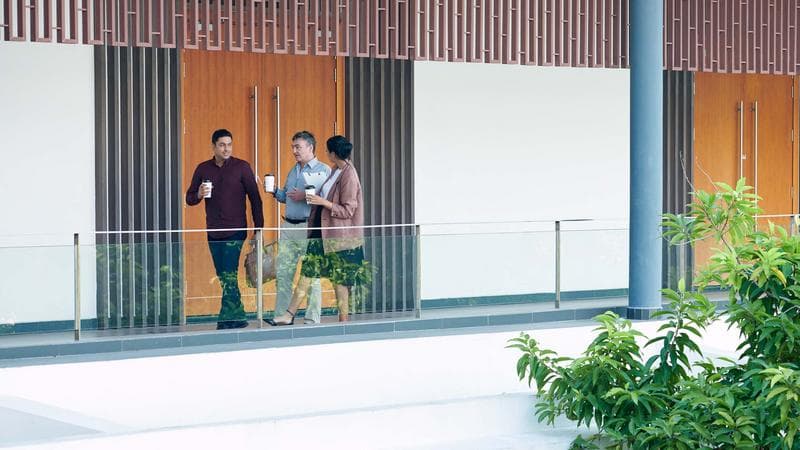The facility management industry has been forced to adapt. Four years after the pandemic shifted how many of us work, organizations are still struggling to find the ideal schedule, space, and amenities to meet the needs of their people. As a result, facility managers have had to think critically about how to deliver consistent attention to a workplace in flux.
With hybrid work becoming the norm for most in-office work, flexibility and connection have to align to achieve a workplace energy that keeps people both productive and engaged. This work model rose out of necessity and adaptability, proving the resilience of workers and reminding us that the only constant is change.
Facility management experienced a similar reckoning. With fewer people in the workplace each week, organizations often choose to downsize the delivery of services or adopt a tentative approach until they figure out the best options for their team. For modern FMs, figuring out a dynamic mix of services and products for an uncertain clientele is part of the job.
In honor of World FM Day, we’re looking at a few of the current considerations facility managers must make and how the demands of a changing world are driving how they think about their roles.
The Management of an Evolving Facility
Client needs dictate how facilities are managed. Between workplace governance and operational planning, developing effective strategies for a facility requires close collaboration and a host of considerations to get everything right. For many organizations, as workplace occupancy now varies depending on the day of the week, FMs must reconsider their approach to certain tasks. For example, a corporate restroom would have been cleaned every two hours prior to the pandemic. Now, occupancy sensors allow facility managers to adjust cleaning frequency based on use.
Technology provides new opportunities to deliver more efficient outcomes for workspaces and employees. Through systems like Clockworks Analytics, facility managers can be more proactive about operations and deliver smarter, more data-driven performance.
“These fault detection and diagnostic tools help us manage buildings and energy demands, which is especially important in office buildings where people are coming and going,” says Todd Robertson, ISS Americas Head of Technical Services. “These tools allow us to do more condition-based maintenance rather than calendar-based maintenance, integrating with building automation and energy management systems to give us real-time data on all the processes we manage, like temperature, water pressure, or the condition of building equipment.”
Todd says that opportunities to use this technology are increasing, and it’s become a critical part of how we manage client assets. It also lends itself to more sustainable models that align with customer ambitions around carbon reduction and waste management.
Sustainability Leads the Way
With more organizations reporting their greenhouse gas emissions and working to reduce their carbon footprint, sustainability is a vital consideration for modern facility management. Many of the efficiency measures that drive sustainable practices are also more cost effective, and ISS is developing more LEED-accredited professionals to boost our team’s knowledge as these skills grow more necessary.
FMs use this expertise to support green initiatives and help clients benefit from them. For example, our teams survey client locations to determine the feasibility of projects that create more energy efficient infrastructure. These efforts reduce costs while also delivering significant reductions in energy usage. Our teams also help clients apply for implementation rebates and other incentives provided by state and local governments, often resulting in hundreds of thousands of dollars in savings in addition to more efficiency in the built environment.
Sustainability is at the center of our company’s work and how we choose our partners and suppliers. When an asset is maintained proactively, it not only prevents unnecessary maintenance and spending but also helps ensure that energy can be saved and used correctly. Organizations are paying more attention to efficiency, sustainability, and cost, especially if their infrastructure is older and requires retrofits to achieve long-term goals, and that is likely to continue as buildings become greener.
The Right People for the Job
To ensure that facility management can keep up with client demand, it’s critical that more people enter the industry and that current employees feel valued and engaged in their roles. Organizations should emphasize a workplace culture that fosters employee satisfaction and provides ongoing opportunities for career development. Offering financial incentives like sign-on bonuses and performance-based salary increases are important for attracting highly skilled professionals, like engineers or technicians, and building a reputation for excellence boosts the company’s profile and ability to hire.
In addition to attracting people through culture and compensation, effective career development offers employees a chance to increase their knowledge, find mentors, and more easily navigate the industry. To maintain and expand on existing expertise, a new generation of facility managers is required to support the business continuity, resilience, and long-term success of our clients. These people make a tangible difference in the day-to-day operations of the workplace, and their roles will only become more important as the workplace evolves to better meet the needs of people. Without successful development, recruiting, and mentorship, critical institutional knowledge can be lost, and organizations can fall behind their competitors.
A Constant State of Change
The facility management industry continues to adapt in response to shifting workplace dynamics, with an emphasis on meeting the needs of companies and their employees alike. As hybrid work remains the norm and sustainability proves increasingly pivotal for how FMs think about their work, attracting and retaining skilled professionals is paramount to meet client demands and ensure industry resilience.
ISS provides comprehensive services through integrated facilities management to maximize the lifetime of your investments — learn more here.

